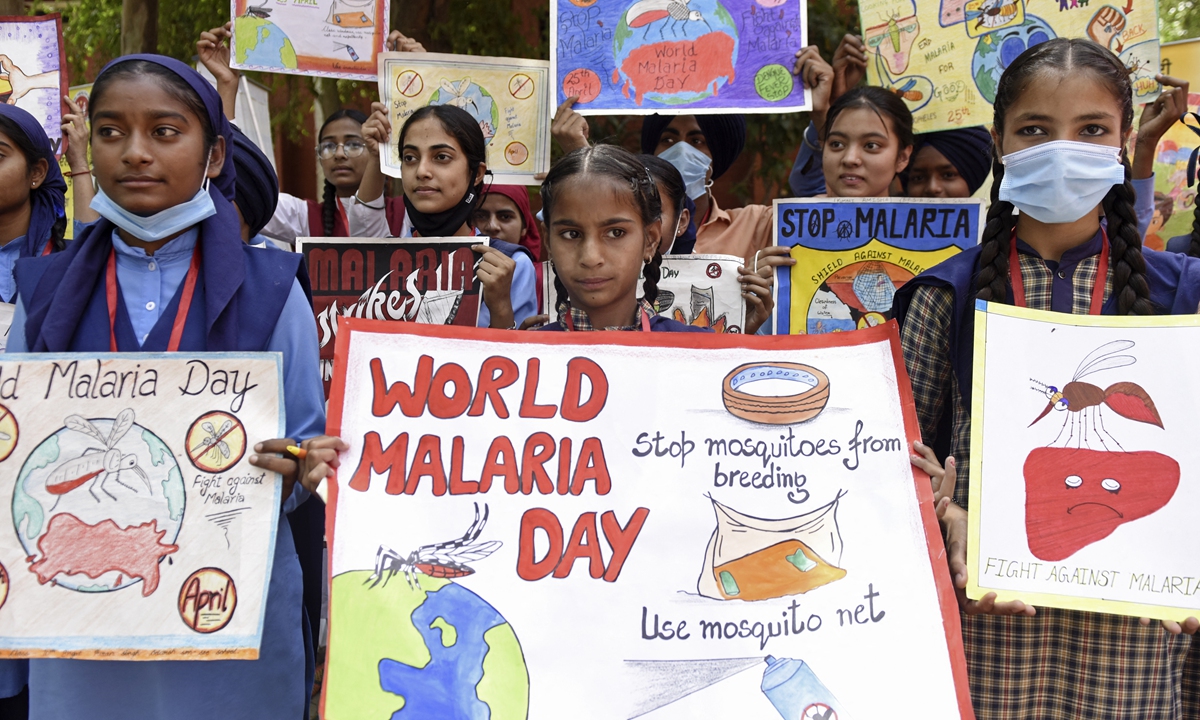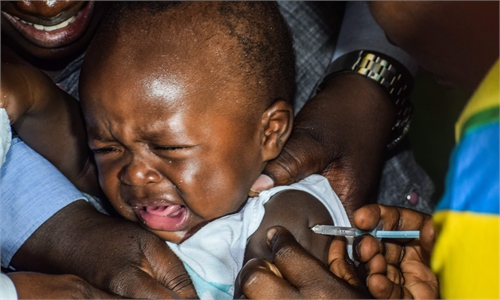
Students hold placards during an event to mark the World Malaria Day at a government hospital on the outskirts of Amritsar, India on April 25, 2022. Malaria remains a deadly disease around the world, primarily affecting children below the age of 5. In Southeast Asia, India is bearing the brunt, accounting for 80 percent of the region's malaria burden, local media said. Photo: AFP
Inbound travelers who have a fever and those who return from malaria-prevalent countries and regions, and those are in quarantine against COVID-19, should undergo malaria tests, the National Health Commission (NHC) said on Thursday, as China's health authorities vowed to strengthen the monitoring of imported malaria cases.
In a notice released on Thursday, the NHC said South China's Guangdong, Southwest China's Yunnan and East China's Zhejiang provinces have reported cases of malaria among inbound travelers, and the risk of an outbreak and transmission of malaria has mounted.
To continue consolidating the defense against malaria, local governments, ports of entry and quarantine venues should strengthen surveillance and screening for the mosquito-borne disease, the NHC said.
The NHC said those who have a fever and those who have come back from malaria-prevalent countries and regions should undergo malaria tests. Moreover, regions that face risks of the spread of malaria are urged to carry out epidemic monitoring and set up relevant sites to cope with a potential malaria epidemic.
The health condition of inbound travelers who have been discharged from quarantine venues should also be followed and checked to avoid transmission, according to the NHC.
China was officially recognized as malaria-free by the World Health Organization (WHO) in 2021, a major accomplishment after several generations of hard work under the leadership of the government, the collaboration of departments, social mobilization and the support of the people. It was hailed as a milestone in the history of public health in the country.
However, given the epidemiological characteristics of malaria, the transmission vectors and epidemic conditions of malaria in China have not fundamentally changed, and the risk of imported cases and re-transmission persists in key areas such as border regions and key populations among labor exporters, the NHC noted.
Gao Qi, chair of the National Malaria Experts Group and a member of the WHO Malaria Policy Advisory Committee, told the Global Times on Thursday that this time, the move by the NHC to list COVID-19 quarantine sites as important venues to screen out imported malaria cases is of great significance.
In the past two years, some of the quarantine sites for inbound travelers did not screen cases for malaria but only COVID-19, so those imported malaria cases were not detected in time, resulting in severe cases and even deaths. Ports of entry are the first defense line against imported malaria, but most cases do not show a fever when they enter the country. Giving inbound travelers a malaria test during their quarantine against COVID-19 makes up for this, Gao explained.
Another reason for the country to raise its alert against malaria is that restrictions on inbound travelers are being gradually relaxed, so it is expected the country will see a rising number of people who were stranded abroad, especially those from African countries, coming back to China, which may increase the chance of imported malaria cases, Gao said.
China continues to ease its visa restrictions for foreigners, with dozens of Chinese embassies having resumed two other types of visa services for foreigners, after it largely suspended issuing visas to foreign students and others more than two years ago at the beginning of the COVID-19 pandemic.
The NHC's alert against malaria comes at a special time when the country is on high alert against COVID-19 and also monkeypox.
Gao said there is still a possibility that a patient with fever could both have malaria and coronavirus infection at the same time, though the possibility is low. If customs monitors imported cases of malaria, monkeypox or COVID-19, they can be distinguished through different pathogen testing, Gao said.
The health authorities specifically mentioned malaria prevention in Yunnan, a province that borders Myanmar, Laos and Vietnam, saying the health surveillance should cover key populations from villages and counties along the border. They urged the province to strictly safeguard against imported cases.
The health authorities stressed plans to continuously improve monitoring and early warning systems, and to maintain a state of vigilance so that when clustered outbreaks are discovered, the affected regions can initiate early warnings and emergency responses in a timely manner to prevent secondary infections.
The NHC asked local health departments and medical institutes to give training to medical personnel and beef up their capability to deal with any emergent malaria outbreak.
China's efforts against malaria started in the 1950s, when the disease was rampant in the southern parts of the country that lie close to other hotspots in Southeast Asia. Over the past two decades, China ramped up efforts and reduced the number of cases in the 1990s from 117,000 to 5,000 annually by providing staff training, laboratory equipment, medicines and new methods to control mosquito propagation, the Xinhua News Agency reported.



